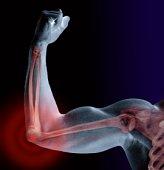BoneFix™
Regular price
$29.95
Sale
BONEFIX™
BoneFix™ with ABCD™ is formulated with three forms of calcium for high bio-availability, along with cofactors that help your body to use calcium.
120 capsules.
Bone Fix is a Durk Pearson and Sandy Shaw Product.
Calcium - not just for women!
Calcium is a fact of life. So is its deficiency. A recent National Institutes of Health conference found that a large percentage of Americans fail to meet the minimum requirements for optimal calcium intake. The consensus panel of the conference concluded that optimal intake varies, ranging from 400 mg/day to 2,000 mg/day, from newborn babies to the elderly. While dietary factors - hormones, drugs, age, and genetics - may influence the amount of calcium required for optimal skeletal health, adequate vitamin D intake was found to be essential for optimal calcium absorption.
Calcium intake, up to a total of 2,000 mg/day, appears to be safe in most people. Yet most individuals cannot obtain this amount from foods, even though dairy products, and thus calcium supplements, are appropriate. Recognizing the difficulties of understanding how to choose a good calcium supplement, our scientist has placed their thinking caps on yet again and come forward with what may be the most inclusive formulation on the market.
What makes BoneFix so different from all the other calcium products on the market?
BoneFix contains tricalcium phosphate, calcium citrate, and calcium ascorbate, among other important components. Other supplements often contain types of calcium that may not be absorbed by the body very efficiently.
Calcium carbonate, the one found in Coral Calcium, is difficult to absorb in the absence of adequate amounts of stomach acid. BoneFix contains calcium citrate (a chelate) and calcium ascorbate (a complex). These forms of calcium do not require any stomach acid; they are thus quite bioavailable. The third calcium, tricalcium phosphate, is closely related to the type that you have in your bones. Tricalcium phosphate is also called 'bone ash,' and differs from the calcium in your bones by having a different crystal structure and by being dehydroxylated, which results in lower acid requirements for dissolution and absorption. Other than the lower stomach acid requirement, it is absorbed and transported by the same mechanisms as bone calcium, a form of calcium that omnivores and carnivores have been consuming for hundreds of millions of years, unlike calcium carbonate. (Calcium carbonate is a good antacid because it uses up so much stomach acid; if you are not producing excess stomach acid, calcium carbonate - such as oyster shells or limestone - is not your best choice.)
Calcium citrate is a calcium/citric acid complex. Your stomach lining has pumps, which pull the citric acid from the lumen of your intestines, in order to transport the calcium/citric acid complex across the intestinal tissue and into your bloodstream. Your gut also has very active pumps for vitamin C. These pumps drive vitamin C from the lumen of the intestine across the intestinal tissue into the bloodstream. And since vitamin C is bound with calcium (calcium ascorbate is a calcium/vitamin C complex), calcium is carried along with it. In fact, there is a significant amount of evidence that suggests that calcium metabolism and your ability to absorb calcium declines very substantially if you don't have enough vitamin C, which is another good reason for including vitamin C.
In addition to vitamin C, we also have vitamin D, because it is necessary for proper calcium transport and metabolism, and a lot of people simply aren't getting enough. If you run around naked all summer, you'd get plenty of vitamin D, but you also put yourself at risk for getting skin cancer.
Unless you're drinking adequate amounts of vitamin-D-fortified milk, it is unlikely you're getting enough vitamin D. And it's been found that for elderly people, vitamin D deficiency is a very serious problem.
Four capsules of our BoneFix contain 800 IU of vitamin D, the amount contained in 1/2 gallon of fortified milk. The Complex also contains beta-carotene. If you don't have enough vitamin A, your body can convert beta-carotene to vitamin A; but if you have enough vitamin A, your body will leave the beta-carotene alone. You must be careful about taking too much vitamin A. In some elderly people who have liver damage, toxic effects have been seen at as little as 15,000 IU a day. But that doesn't happen with beta-carotene, because your body shuts off the conversion of beta-carotene to vitamin A when you have adequate amounts.
Vitamin A is important for the regulation of vitamin D receptors. As you can see there is so much more than plain ordinary calcium in our BoneFix. Take BoneFix four times a day along with our other vitamin supplements when you get up in the morning, at lunch, with dinner, and at bedtime.
| Serving size: 1 Capsule Servings per container: 120 |
Amount Per Serving |
% Daily Value |
||
| Vitamin A (as beta-carotene) | 0.75 mg | 50 | ||
| Vitamin C (as calcium ascorbate) | 55 mg | 92 | ||
| Vitamin D (as cholecalciferol) | 200 IU | 50 | ||
| Calcium (as tricalcium phosphate, calcium citrate, and calcium ascorbate) | 250 mg | 25 | ||
| Boron (as calcium borate) | 1 mg | * | ||
|
* Daily Value Not Established |
||||
These statements have not been evaluated by the Food and Drug Administration. This product is not intended to prevent, diagnose, treat, or cure any disease.



